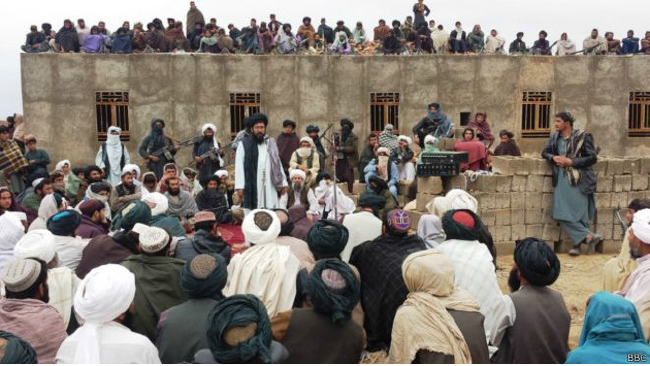According to a local news report, the Taliban splinter group – who refused to pledge allegiance to Mansour – has elected Mullah Mohammad Rasool Akhund as Omar’s successor. “Akhund is our new emir. He will now lead the Mujahedeen to continue their fight against the US-led foreign forces and the Afghan security troops,” a senior member of the rival party is quoted as saying. However, the announcement is yet to be confirmed by Afghan Taliban.
A rift emerged between the warring parties when the death of Mullah Omar was revealed this year on July 29. The news came two years later than the death of Mullah Omar – which was a secret for many high-ranking Taliban members. The appointment of Mullah Mansour as Omar’s successor has been a bone of contention between the Taliban from the very first day up to now. Previously, the family of deceased Taliban leader Mullah Omar refused to pledge loyalty to Mansour but they reached a settlement later.
Similarly, Mullah Mansour Dadullah, a battlefield commander leading a breakaway faction of the Taliban, had also refused to pledge allegiance to Mullah Akhtar Mansour and accused him of being subdued to Pakistan. A skirmish broke out between Dadullah and Mansour but Dadullah was reportedly rescued by the Islamic State of Iraq and the Levant (ISIL).
Despite its recent moderate success in Kunduz, it is rumoured that the rift is growing, with the opposition to Mansour being led by Mullah Omar’s son. It is a divide ISIL will be eager to exploit.
Fighting to reconstitute the historical Khorasan into the so-called “caliphate” of Abu Bakr al-Baghdadi, the ISIL poses threat to the Taliban through battling and creating gap between the Taliban’s warring elements.
Causing friction with the regional and overall leadership of the Taliban, armed battles have increased over the past few months with dozens of Taliban fighters killed in clashes, most notably in the Taliban stronghold of Nangarhar province.
ISIL’s local chapter has also managed to attract dozens of fighters from the Taliban’s ranks into its fold, while foreign fighters unable to make it to Syria and Iraq have thronged to the group’s territory.
The precursor group to ISIL, comprised mainly of disaffected Pakistani Taliban, first began making inroads into Afghanistan in 2014, announcing their arrival with the hanging of a dozen Taliban commanders in Nuristan Province.
In February, the Pentagon spokesman had called ISIL’s presence in Afghanistan “nascent at best”, but by October, the US commander in Afghanistan, General John Campbell, said that the group had transitioned from “nascent” to “operationally emergent”. It had a presence, he said, in two regions of Afghanistan: Helmand and Farah provinces in the southwest and Nangarhar in the east, along the border with Pakistan.
“ISIL preaches a version of jihad that’s a militant form of contemporary Islamist political ideology that seeks to re-establish the caliphate, a state with jurisdiction over all Muslims, and enforce a harsh version of Islamic law based on a literal interpretation of the Holy Koran and sayings and practices of the Holy Prophet (PBUH).
The Taliban, however, accept Afghanistan as a nation-state and indeed express pride in its history. They have repeatedly said that their jihad is limited to their own country.”
One group now in Afghanistan has recently renounced its affiliation to the Afghan Taliban and given allegiance to Baghdadi and ISIL: the Islamic Movement of Uzbekistan (IMU), which Pakistan’s military has pushed out of the tribal areas and into Afghanistan.
The reason behind the rule that Afghan Taliban do not join ISIL, Abdul Rauf Khadim, proves that sectarian differences can be decisive. Khadim, whom ISIL had appointed deputy emir of Khurasan province and was killed by a drone in July 2015, had been expelled from the Afghan Taliban. While detained in Guantanamo, Khadim accepted the jihadist preaching of his Arab cellmates.
In such a sensitive state as the Taliban and ISIL deteriorate the security situation in Afghanistan, Pakistani officials, who insisted on resuming peace talk, say that now it is not ripe for talk. Pakistani Adviser on Foreign Affairs Sartaj Aziz said that it is not the right time for Pakistan to work for the revival of Afghan reconciliation process.
Addressing a press conference on Monday, Mr. Aziz explained that for revival of peace talks both warring sides needed to be convinced about the usefulness of the process and should create the right atmosphere for it.
“Pre-conditions for a successful outcome are required, and that requires consensus on both sides. The Afghanistan government is one of the sides and the Taliban are the other, and they have to come to the situation which they think that useful discussions can take place,” he said.
But Aziz suggested that reconciliation was the surest way to peace in Afghanistan. “Obviously, anything that will reduce the level of insurgency and infighting would be welcomed by Pakistan. Reconciliation is in our view, as the Washington statement also says, one of the best (options),” the adviser said.
Now, it is the Afghan government to decide how to tackle the security crisis and deal with both the warring factions: the Taliban and the ISIL insurgents. But I believe that one strategy will not respond positively to two different groups.

